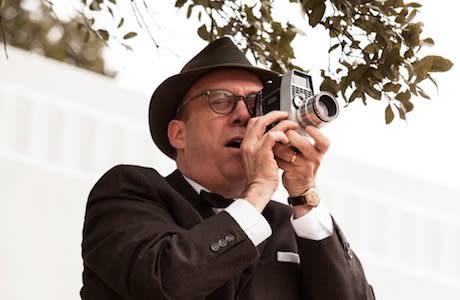Peter Landesman (the journalist that wrote the allegedly fictitious New York Times article that inspired sex slave drama Trade) is again diving into speculative nonfiction territory with Parkland, a movie that attempts to recreate the chaos occurring at Parkland Hospital in Dallas, Texas the day John F. Kennedy was shot. The distinction is that writing and directing a feature-length movie are very different than writing an article, having an endless list of narrative and technical needs, as well as considerations that extend well beyond doing research and ensuring basic clarity.
Fortunately, Landesman does present a story that, if nothing else, makes sense. It opens with a bit of preamble and contextualizing for the impending assassination, introducing Jim Carrico (Zac Efron), a doctor, James Hosty (Ron Livingston), an FBI Agent, and Abraham Zapruder (Paul Giamatti), a women's clothing manufacturer who would capture the shooting on Super 8 film. All of these people — and many, many others — factor into the equation, having individual experiences that relate to the events that occurred on November 22, 1963, which, for the most part, haven't been considered or contemplated within the lexicon of historical documentation.
What's less fortunate is how Landesman handles these narratives within the context of the bigger picture. Every storyline — even when Lee Harvey Oswald and his mother, Marguerite (Jacki Weaver), are introduced — is handled with the same heavy-handed and woefully melodramatic blandness, fitting together not by thematic continuity but by a gaudy, handheld visual aesthetic and oppressive, often embarrassing overacting.
Landesman, not knowing how to reel actors in when they indulge in their showy, theatrical histrionics, merely captures people yelling and crying incessantly, overdoing every scene in such an absurdly amateur manner that it becomes draining by the time Oswald is gunned down by Jack Ruby.
We know that the shooting upset everyone, which is sort of implicit, but we don't get a great deal of individual identifiers or motivations beyond this. Marguerite, being delusional, is the only distinguishable person amidst the many screeching, yelling caricatures positioning themselves as real people trying to function and cope during a very dramatic and turbulent time.
Worse is that there's absolutely no thematic continuity beyond the obvious presentation of anecdotal evidence with a facile television sensibility not entirely dissimilar to an episode of ER. There's the vague sense that Landesman is criticizing our collective social tendency to judge without proof, juxtaposing the spectacle of Kennedy's funeral with the piss-and-vinegar vitriol in which Oswald's elimination unfolded, but, as is the standard with the rest of Parkland, this has more to do with timing than cinematic intention.
Eventually, after everyone is done endlessly dramatizing how important Kennedy's dignity is — they even make sure to leave his boxers on during surgery — it becomes clear that the only point is that of telling the story of those on the historical periphery.
However, with nothing else to back it up, aside from sensationalized melodrama and cheesy, overly self-righteous dialogue, Parkland comes across as the Transformers of biopics, being little more than indulgent trash entertainment for people that validate their middle-class identity via issue attachment, rather than charitable donation.
(Remstar)Fortunately, Landesman does present a story that, if nothing else, makes sense. It opens with a bit of preamble and contextualizing for the impending assassination, introducing Jim Carrico (Zac Efron), a doctor, James Hosty (Ron Livingston), an FBI Agent, and Abraham Zapruder (Paul Giamatti), a women's clothing manufacturer who would capture the shooting on Super 8 film. All of these people — and many, many others — factor into the equation, having individual experiences that relate to the events that occurred on November 22, 1963, which, for the most part, haven't been considered or contemplated within the lexicon of historical documentation.
What's less fortunate is how Landesman handles these narratives within the context of the bigger picture. Every storyline — even when Lee Harvey Oswald and his mother, Marguerite (Jacki Weaver), are introduced — is handled with the same heavy-handed and woefully melodramatic blandness, fitting together not by thematic continuity but by a gaudy, handheld visual aesthetic and oppressive, often embarrassing overacting.
Landesman, not knowing how to reel actors in when they indulge in their showy, theatrical histrionics, merely captures people yelling and crying incessantly, overdoing every scene in such an absurdly amateur manner that it becomes draining by the time Oswald is gunned down by Jack Ruby.
We know that the shooting upset everyone, which is sort of implicit, but we don't get a great deal of individual identifiers or motivations beyond this. Marguerite, being delusional, is the only distinguishable person amidst the many screeching, yelling caricatures positioning themselves as real people trying to function and cope during a very dramatic and turbulent time.
Worse is that there's absolutely no thematic continuity beyond the obvious presentation of anecdotal evidence with a facile television sensibility not entirely dissimilar to an episode of ER. There's the vague sense that Landesman is criticizing our collective social tendency to judge without proof, juxtaposing the spectacle of Kennedy's funeral with the piss-and-vinegar vitriol in which Oswald's elimination unfolded, but, as is the standard with the rest of Parkland, this has more to do with timing than cinematic intention.
Eventually, after everyone is done endlessly dramatizing how important Kennedy's dignity is — they even make sure to leave his boxers on during surgery — it becomes clear that the only point is that of telling the story of those on the historical periphery.
However, with nothing else to back it up, aside from sensationalized melodrama and cheesy, overly self-righteous dialogue, Parkland comes across as the Transformers of biopics, being little more than indulgent trash entertainment for people that validate their middle-class identity via issue attachment, rather than charitable donation.
